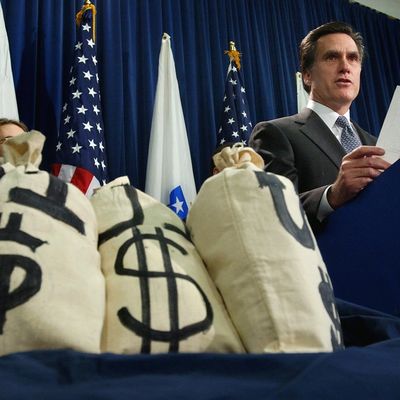
So, to recap Mitt Romney’s new stump speech, he thinks Americans should vote on whether they’re financially better off than they were in 2008 — which is to say, they should blame President Obama for the effects of the Great Recession. He accuses Obama of attempting to run the campaign instead on “diversions, distractions, and distortions.”
What does Romney mean by that? He means that Obama wants Americans to base their vote on who has their interest at heart. Obama argues, and I would agree, that Romney’s agenda advances the narrow interests of the richest Americans at the expense of the broader interest. And of course, this is a fundamental ideological divide between the two candidates and their parties. Democrats want to maintain (and slightly expand) the government’s role in redistributing income from the best-off Americans to the most vulnerable. Republicans consider that sort of redistribution essentially illegitimate. What Romney calls a distraction is actually the most important issue of the election.
That isn’t to say he ignores it completely. Romney’s speech does contain one somewhat oblique passage in which he attempts to turn the fairness issue back against Obama. His argument is revealing. Here’s how Romney puts it:
I have a very different vision for America, and of our future. It is an America driven by freedom, where free people, pursuing happiness in their own unique ways, create free enterprises that employ more and more Americans. …
This America is fundamentally fair. We will stop the unfairness of urban children being denied access to the good schools of their choice; we will stop the unfairness of politicians giving taxpayer money to their friends’ businesses; we will stop the unfairness of requiring union workers to contribute to politicians not of their choosing; we will stop the unfairness of government workers getting better pay and benefits than the taxpayers they serve; and we will stop the unfairness of one generation passing larger and larger debts on to the next.
In the America I see, character and choices matter. And education, hard work, and living within our means are valued and rewarded. And poverty will be defeated, not with a government check, but with respect and achievement that is taught by parents, learned in school, and practiced in the workplace.
Romney has to couch the implications of his argument carefully, but the underlying logic is perfectly clear. He believes that fairness is defined by market outcomes. If Romney earns a thousand times as much as a nurse in Topeka, it is solely because his character, education, or hard work entitle him to that. To the extent that unfairness exists, it is solely the doing of government: clean energy, laws permitting union dues, overpaid government employees, and so on. Aside from unfairness imposed by government, poverty is attributable to the bad choices or deficient character or upbringing of poor people.
Now I doubt that Romney actually believes the full implications of this, even though many Republicans certainly do. But it is striking that Romney’s formulation makes no allowance for the role of government in alleviating unfairness created by the marketplace. To be sure, he is just making a campaign speech, but every speech by Obama invariably has passages lauding the marketplace and wealth. Here’s Obama yesterday:
In America, we admire success. We aspire to it. I want everybody here to do great, be rich, go out and start a business. That’s wonderful.
Now, campaign rhetoric is campaign rhetoric, but in this case it reflects an underlying reality. Obama wants the government to do a bit more to reduce inequality, but he is not proposing to change the United States’ place as the most unequal advanced economy on Earth. His opponent has adopted the position that any interference with the natural level of inequality created by the market is illegitimate. He may not want to take that philosophy to its absolute limit, but he is running on a program that would go very far toward implementing it.
The desire by Democrats to center the campaign on this basic philosophical choice is not a distraction, nor is it an attack on wealth. It’s an attempt to highlight what the election is actually about.






























